- Home
- Robin McKinley
Pegasus
Pegasus Read online
Robin McKinley has won many awards, including the Newbery Medal for The Hero and the Crown, a Newbery Honour for The Blue Sword and the Mythopoeic Award for Adult Literature for Sunshine.
She lives in Hampshire with her husband, author Peter Dickinson, two hellhounds nicknamed Chaos and Darkness, an 1897 Steinway upright named Rhodanthe, and increasing numbers of rose bushes wedged into three tiny gardens. The view out of her office window is her change-ringing bell tower and in the next village over is a paragon among horses whom Robin is so fortunate as to have permission to ride.
Check out her blog at robinmckinleysblog.com.
ROBIN McKINLEY
PUFFIN
PUFFIN BOOKS
Published by the Penguin Group
Penguin Books Ltd, 80 Strand, London WC2R 0RL, England
Penguin Group (USA) Inc., 375 Hudson Street, New York, New York 10014, USA
Penguin Group (Canada), 90 Eglinton Avenue East, Suite 700, Toronto, Ontario, Canada M4P 2Y3 (a division of Pearson Penguin Canada Inc.)
Penguin Ireland, 25 St Stephen’s Green, Dublin 2, Ireland (a division of Penguin Books Ltd)
Penguin Group (Australia), 250 Camberwell Road, Camberwell, Victoria 3124, Australia (a division of Pearson Australia Group Pty Ltd)
Penguin Books India Pvt Ltd, 11 Community Centre, Panchsheel Park, New Delhi – 110 017, India
Penguin Group (NZ), 67 Apollo Drive, Rosedale, Auckland 0632, New Zealand (a division of Pearson New Zealand Ltd)
Penguin Books (South Africa) (Pty) Ltd, 24 Sturdee Avenue, Rosebank, Johannesburg 2196, South Africa
Penguin Books Ltd, Registered Offices: 80 Strand, London WC2R 0RL, England
puffinbooks.com
First published in the USA by G. P. Putnam’s Sons, a division of Penguin Young Readers Group, 2010
This edition published in Great Britain in Puffin Books 2011
Text copyright © Robin McKinley, 2010
All rights reserved
The moral right of the author has been asserted
Except in the United States of America, this book is sold subject to the condition that it shall not, by way of trade or otherwise, be lent, re-sold, hired out, or otherwise circulated without the publisher’s prior consent in any form of binding or cover other than that in which it is published and without a similar condition including this condition being imposed on the subsequent purchaser
A CIP catalogue record for this book is available from the British Library
ISBN: 978-0-141-96945-9
To the Wonder-Mods*:
Ajlr, B_twin, Black Bear, Gryphyn,
Ithilien, Jodi, Maren and Southdowner,
with love from a grateful hellgoddess
Table of Contents
CHAPTER 1
CHAPTER 2
CHAPTER 3
CHAPTER 4
CHAPTER 5
CHAPTER 6
CHAPTER 7
CHAPTER 8
CHAPTER 9
CHAPTER 10
CHAPTER 11
CHAPTER 12
CHAPTER 13
CHAPTER 14
CHAPTER 15
CHAPTER 16
CHAPTER 17
CHAPTER 18
CHAPTER 19
CHAPTER 1
Because she was a princess she had a pegasus.
This had been a part of the treaty between the pegasi and the human invaders nearly a thousand years ago, shortly after humans had first struggled through the mountain passes beyond the wild lands and discovered a beautiful green country they knew immediately they wanted to live in.
The beautiful green country was at that time badly overrun by ladons and wyverns, taralians and norindours, which ate almost everything (including each other) but liked pegasi best. The pegasi were a peaceful people and no match, despite their greater intelligence, for the single-minded ferocity of their enemies, and over the years their numbers had declined. But they were tied to these mountains and valleys by particular qualities in the soil and the grasses that grew in the soil, which allowed their wings to grow strong enough to bear them in the air. They had ignored the situation as without remedy for some generations, but the current pegasus king knew he was looking at a very bleak future for his people when the first human soldiers straggled, gasping, through the Dravalu Pass and collapsed on the greensward under the Singing Yew, which was old even then.
They sat up quickly when seven pegasi circled the meadow above the pass and flew down to investigate. The journal of that company’s second commander still exists in the palace library: a small, worn, round-cornered, hand-bound book, slightly bowed to the shape of the pocket it was carried in. He reported the historic meeting:
We had but just come through thee final rocky gate, and had sett ourselves down in thee shade of a strange great tree, which had short soft spikes or needles all along its branches, and no leaves; when swift-moving shadows fled briefly between us and thee sunne, but against thee wind. We looked up in haste, for rocs are not unheard of, and I had raised my hand to give thee signal for thee archers to string their bows. We saw at once that these were no rocs, but still I held up my hand, for they were nothing else we knew either; and they clearly had seen us, and did approach.
But these creatures are nothing like rocs except they do also possess wings; they are like nothing I have ever seen, except perhaps by some great artist’s creative power. They are a little like horses, but yet far more fine than any horse, even a queen’s palfrey; they are a little like deer, except that deer are rough and clumsy beside them; and their wings are huge, huger than eagles’, and when thee lowering sunne struck through their primaries, for as they cantered toward us they left their wings unfurled, thee light was broken as if by prisms, and they were haloed in all thee colours of thee rainbow. Several of my folk came to their knees, as if we were in thee presence of gods; and while I told them to stand and be steadfast, I did tell them gently, for I understood their awe.
The pegasi were happy to make a treaty with the humans, who were the first possibility of rescue the pegasi had had, and the humans, dazzled by the pegasi’s beauty and serenity, were happy to make a treaty with them, for the right to share their mountainous land; the wide plateaus, which ran like lakes around the mountaintop islands, were lush and fertile, and many of the island crests were full of gems and ores.
The discussions as to the terms of the treaty had had to be held almost exclusively through the human magicians and the pegasi shamans, however, who were the only ones able to learn enough of the other’s language to understand and make themselves understood, and that was a check to enthusiasm on both sides. “Is it not, then, a language, as we understand language?” wrote the second commander, whose name was Viktur. “Does it encompass some invisible touch unavailable to humans, as a meeting of our hands in greeting, or a kiss between dear friends? What can we not grasp of it, and why cannot our magicians explain this lack to us?”
Sylvi’s tutor, Ahathin, had brought Sylvi to the library while they were studying this portion of the annals. Ordinary people needed a sheaf of special permissions to look at anything half so old, frail and precious as the second commander’s journal; Ahathin, as the princess’ tutor, had merely made the request, and when the two of them appeared at the library door, the head librarian himself bowed, saying, “Princess, Worthy Magician,” and led them to the table where the journal already lay waiting for them—with an honour guard of the Queen’s Own Lightbearers standing on either side of the table. The queen was the library’s governor. Sylvi looked at them thoughtfully. They were wearing their swords, but they were also wearing hai,
to indicate that they could not hear anything she and Ahathin said to each other. There were two kinds of hai: the ceremonial and the invested. The ceremonial ones just hung over your ears and looked silly; invested hai had been dedicated by a magician and really stopped the wearer’s hearing. You couldn’t tell by looking at them which kind they were. Sylvi had often wondered how hai-wearing guards were going to protect anything if they couldn’t hear anyone coming. Was there a protocol for when an honour guard wearing ceremonial hai could stop pretending they couldn’t hear?
Sylvi tried to concentrate on what she was reading. She liked reading better since Ahathin had become her tutor; she would still rather be outdoors with her hawk and her pony, but it was thrilling, in a creepy, echo-of-centuries way, to be looking at Viktur’s own journal. She was allowed to touch it only while wearing the gloves the librarian had given her, and there were furthermore these odd little wooden paddles for turning the pages. But she had—carefully, carefully—turned all the pages over, back to the very beginning, to look at Viktur’s signature on the flyleaf: Viktur, Gara of Stormdown, Captain of the White Fellowship, who do follow Balsin, Gara of Mereland, All Commander of His Companies. Most of the curly handwriting was still surprisingly black and sharp against the pale brown flyleaf. A tiny faded arrow, almost invisible, had been drawn just before Balsin, and the word King written in above, and the Gara of Mereland following had been struck out. “Gara?” said Sylvi.
“Lord,” said Ahathin. “A gara is below a prince and above a baron. It is a rank no longer much in use.”
“Then Viktur was pretty important,” said Sylvi. “Balsin was only a gara to begin with.”
“Viktur was important. Some commentators say that Balsin would not have made king if Viktur had not supported him—that perhaps Balsin would not have been able to put a strong enough company together to come this far through the wild lands, nor to drive our foes out of it once they arrived. That perhaps our country would not have been created, were it not for Viktur.”
“Stormdown and Mereland—they’re here.”
“The original Stormdown and Mereland are in Tinadin, which is Winwarren now, where Balsin and Viktur originally were from. They’d won a famous victory for their king—who now wanted to be rid of them before Balsin started having fancies about being king of Tinadin. Everyone is very clear that Balsin was very ambitious; and, of course, he had the Sword. It was apparently worth it to their king—whose name was Argen or possibly Argun—to lose half his army to be rid of Balsin. Argen married the daughter of the king Balsin defeated, so presumably he thought he could afford it.”
Sylvi cautiously turned the pages back to Viktur’s first sight of the pegasi, and then on to the second marker. There was something that looked like the remains of a grubby fingerprint on one corner of the page she was looking at, and what might be a bloodstain on the bottom edge of the little book. “… and why cannot our magicians explain this lack to us?” She stopped, startled, and reread the entire sentence, and then looked up at Ahathin. “That’s not—I haven’t seen that before, that last,” and gingerly she touched the brittle old page. Even through the thin glove she could feel the roughness of the paper: modern paper was smooth—paper-making was one of the things the pegasi had taught their allies, and for special occasions or particularly important records, pegasus-made paper was still preferred.
Mostly she did her studying in the room off her bedroom in the main part of the palace, where she now spent several (long) hours every day with Ahathin. The copy of the First Annals she was reading was the copy several generations of royal children had read, and included several games of tic-tac-toe on the end papers, imperfectly erased, played by her next-elder and next-next-elder brothers, who were only eleven months apart in age, and a poem her father had written about an owl when he had been a few years younger than she was now. (It began: The Owl flys at night. To give the mice a fright. It soars and swoops. The mice go oops.) Her eldest brother, and heir to the throne, had never written in his school-books.
She looked up at Ahathin, who stood beside her. There was only one chair at the table. She wanted to stand up herself, or drag another chair from another table so that Ahathin could sit down, but she knew she mustn’t. The single chair and the presence of the honour guard with their hai meant that this was a formal occasion. Princesses sat down. Lesser mortals did not. This included tutors—even tutors who were also magicians, and members of the Guild of Magicians. She didn’t like formal occasions. They made her feel even smaller and mousier than she usually felt.
She also didn’t like it that the familiar, beat-up—almost friendly, if a school-book was ever friendly—copy of the annals that she knew had a missing phrase; she didn’t like it that Ahathin was making such a fuss about her reading the missing phrase. She especially didn’t like it when her own binding was so near—her binding to her pegasus.
Ahathin was small and round and almost bald and wore spectacles and a harmless expression, but he was still a magician. He looked no less small, round and harmless than he ever had right now as she stared at him, but for the first time she thought: Looking harmless is his disguise.
She had known Ahathin all her life. She could remember him sitting on the floor to play with her when she was tiny—she could remember looking dubiously at her first set of speaking tiles, with human letters and words on one side and the gestures you were supposed to use with the pegasi on the other, and Ahathin patiently explaining them to her. She’d learnt to sign “hello, friend” from Ahathin.
She’d known him all her life, and suddenly she didn’t know him at all. She tried to swallow the lump in her throat, but it stayed where it was.
Ahathin nodded. “It’s not in any of the copies of the annals I’ve looked in—there are quite a few.”
“Why?”
At his most harmless, he said mildly, “I don’t know.”
She looked back at the journal. “Does my father know? Does Danacor?”
Ahathin nodded again. “Certainly the king knows. And the heir. I asked your father if I might show this to you.”
“Why?”
Ahathin said nothing. This meant he wanted her to answer her own question. But sometimes, if she said something unexpected, she got an unexpected response. “Why can’t magicians explain what it is about the pegasi language that the rest of us can’t learn it?”
Ahathin nodded as if this were an acceptable question. “It is a curious skill, speaking to pegasi, and not even all magicians can do it—do you know this?”
Fascinated, Sylvi shook her head.
“We are well into our apprenticeship before it is taught at all, and many of us will already have been sent home to be carpenters or shepherds, for we will not make magicians. And indeed there is little enough of teaching about it, to begin with. Imagine learning to swim by being thrown into a lake in perfect darkness, never having seen water before. Those who do not drown are then taught; the best of them may then go on to become Speakers. But that is the moment when as many as half of us are sent away, although by that time an apprentice has learnt enough that if he—or she—wishes he can set up as a village spell-caster somewhere.”
Imagine learning to swim by being thrown into a lake in perfect darkness, never having seen water before. “But the pegasi—they—they are so light. They—they fly. Drowning in a dark sea—I—it doesn’t sound like anything to do with pegasi.”
“No, it doesn’t,” said Ahathin. “It does not at all.”
Sylvi knew the rest of the official story of the making of the treaty. She was obliged to be able to parrot a brief accurate version of it as part of her training as daughter of the king. She was obliged to be able to parrot a number of historical titbits on command (although why this was considered a necessary attribute in a princess she had no idea, her father sprang questions at her occasionally so that she did need to was not in doubt) but this was one of the few of her history lessons that we
re live pictures in her head instead of dry words in her memory.
The first beginnings of the treaty had been almost insurmountably difficult; not only was there the obstacle of their spoken languages, of which neither side could learn the other’s, but the pegasi did not have an alphabet as humans understood it. Instead they had a complex and demanding art form of which various kinds of marks on paper were only a part…. The human magicians translated its name into human sounds as ssshasssha and said it meant “recollection,” and that it appeared to include or address all the senses—sight, hearing, touch, taste, feeling—although how this was accomplished the magicians were uncertain. There were pegasus bards and story-tellers in some manner, presumably, as there were human bards and story-tellers; there were also pegasi … they didn’t know. This was the first time the humans heard about the Caves, and the sculptors; but none of this assisted the drawing up of a document that humans understood as legal and binding.
“Did we not both want this union very badly,” wrote the second commander, “such impedimenta as there manifestly are would have stopped us utterly and our company would be homeless again; and I am grateful hourly that thee pegasi want us, for already I love this sweet green land, and would not willingly leave it.”
This sweet green land was probably the most famous phrase of the second commander’s journal; it was one of those phrases everyone used, like sick as a denwirl owl or mad as a mudge. One of the first songs Sylvi had ever learnt to sing herself, when she was still so small she couldn’t say her rrr’s yet, was an old folk ballad about a wandering tinker whose refrain was: On the road to nowhere through this sweet green land. The second commander seemed almost to be standing at her elbow as she read the old phrase as he had put it down the first time.
Both sides at last declared themselves satisfied with the final draft of the treaty. “The pegasi ask for little,” wrote the second commander.

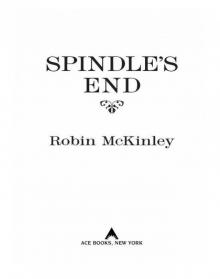 Spindle's End
Spindle's End The Door in the Hedge: And Other Stories
The Door in the Hedge: And Other Stories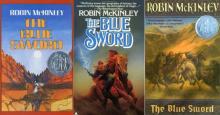 The Blue Sword
The Blue Sword Rose Daughter
Rose Daughter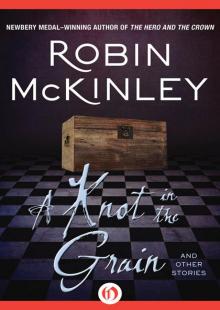 A Knot in the Grain and Other Stories
A Knot in the Grain and Other Stories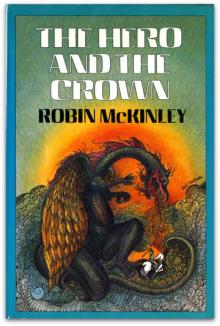 The Hero And The Crown
The Hero And The Crown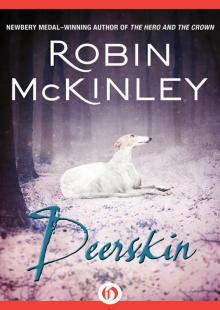 Deerskin
Deerskin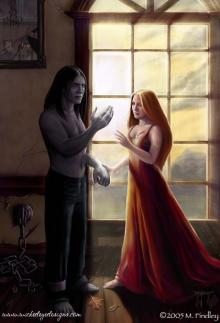 Sunshine
Sunshine Beauty: A Retelling of the Story of Beauty and the Beast
Beauty: A Retelling of the Story of Beauty and the Beast Shadows
Shadows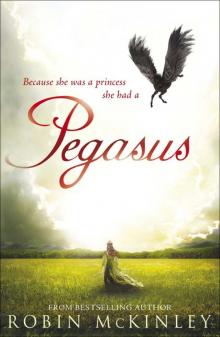 Pegasus
Pegasus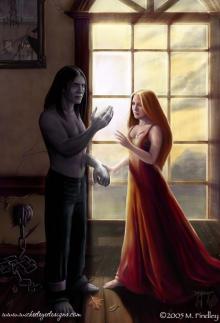 Chalice
Chalice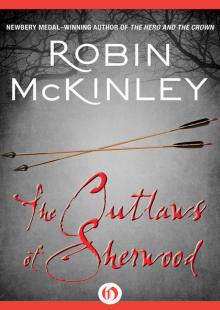 The Outlaws of Sherwood
The Outlaws of Sherwood Fire: Tales of Elemental Spirits
Fire: Tales of Elemental Spirits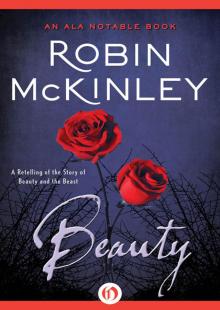 Beauty
Beauty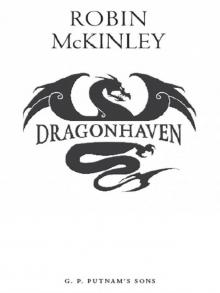 Dragon Haven
Dragon Haven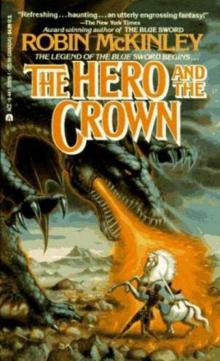 The Hero And The Crown d-2
The Hero And The Crown d-2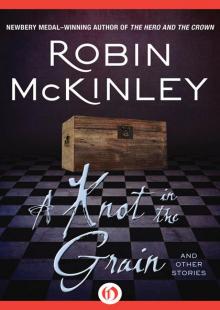 A Knot in the Grain
A Knot in the Grain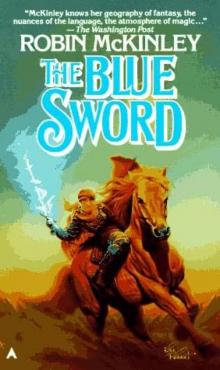 The Blue Sword d-1
The Blue Sword d-1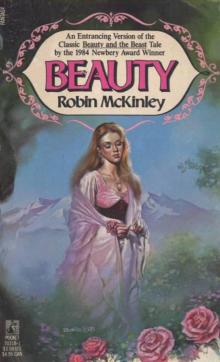 Beauty (v1.2)
Beauty (v1.2) The Door in the Hedge
The Door in the Hedge